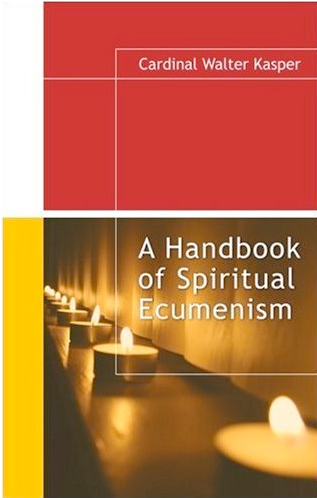The book description on Amazon includes:
This Handbook offers practical suggestions for implementing and strengthening spiritual ecumenism… It is grounded in the documents that have shaped the Catholic Church's engagement in seeking Christian unity, those of the Second Vatican Council, as well as others such as the encyclical Ut Unum Sint and the Catechism of the Catholic Church.
Amazon also gives biographical info about the author:
Walter Cardinal Kasper, born in Germany in 1933, was ordained a priest in 1957. An accomplished theologian and author of many books and articles, he studied at the University of Tübingen and taught at The Catholic University of America in Washington, D.C. Wide respect for Kasper's ecumenical work led John Paul II to appoint him president of the Pontifical Council for Promoting Christian Unity, a position he has held since 2001.
I'll get to comment and facilitate discussion about the 3-section Preface that touches on three subjects (A Handbook; Spiritual Ecumenism; Growing in Communion) as well as the 2-part Chapter 1, Deepening Christian Faith (The Word of God in Sacred Scripture; Witnesses to the Word of God). Although I trust our group discussion will enlighten me, from my perspective something is un-okay, especially given the copyright dates of 2006 and 2007.
 First, I'm curious about the implications and resonations of the word spiritual with a lower-case "s". Even non-church people often talk generically about spiritual aspects of existence (and hey, everyone's heard "I'm not religious but I'm spiritual" far too many times), which includes the Holy Spirit's call to us and claim upon our lives, whether or not we actively admit to it, along with the Spirit of Life's sanctifying actions in human persons and communities, in the Church and the churches, throughout creation and pervading the world, *even* institutional, organizational, and bureaucratic structures—Jesus made hash of the power and principalities… Churches of Reformation heritage long ago cited Word and Sacrament as essential for the local (and global) presence of the Church, with other things being not-so of the essence, or adiaphora. Days of forming new church bodies out of the old on a basis of structural, organic union followed by re-denominating most likely are over, but the protestant mainline (is the concept of culturally, socially, and theologically mainline still viable, still a reality?) remains committed to conversation and exploration of ways to attain and to thrive with full-communion agreements and related enduring partnerships under the sovereignty of Jesus Christ. In all of this, it's not simply about spiritual aspects of the gospel, but about the fullness of redemption Jesus Christ brought to the world and calls the church to continue doing.
First, I'm curious about the implications and resonations of the word spiritual with a lower-case "s". Even non-church people often talk generically about spiritual aspects of existence (and hey, everyone's heard "I'm not religious but I'm spiritual" far too many times), which includes the Holy Spirit's call to us and claim upon our lives, whether or not we actively admit to it, along with the Spirit of Life's sanctifying actions in human persons and communities, in the Church and the churches, throughout creation and pervading the world, *even* institutional, organizational, and bureaucratic structures—Jesus made hash of the power and principalities… Churches of Reformation heritage long ago cited Word and Sacrament as essential for the local (and global) presence of the Church, with other things being not-so of the essence, or adiaphora. Days of forming new church bodies out of the old on a basis of structural, organic union followed by re-denominating most likely are over, but the protestant mainline (is the concept of culturally, socially, and theologically mainline still viable, still a reality?) remains committed to conversation and exploration of ways to attain and to thrive with full-communion agreements and related enduring partnerships under the sovereignty of Jesus Christ. In all of this, it's not simply about spiritual aspects of the gospel, but about the fullness of redemption Jesus Christ brought to the world and calls the church to continue doing.So I'm asking what lower-case "s" spiritual ecumenism is all about! The gospel does have a spiritual aspect, but also physical, social, and cultural dimensions; while almost easily acknowledging essential unity, although there are many reasons The Protestants no longer are going for organic union between church bodies, reconciling differing polities along with more structural organizational arrangements has been one of the major concerns and difficulties in the past. Every one of us lives in a world bounded by language, geography, and an array of other factors, and we gotta live together with and despite those differences. In addition, the redemption and sanctity of all creation – not simply human creatures – is a huge part of the Bible's and Jesus' reality, and I'm wondering how the Roman Catholic Church, maybe especially with its emphasis on sacraments and a sacramental worldview, complacently can focus even primarily on the small-"s" spiritual?
At this time I've read no further than my assigned portion, but throughout chapter 1 Cardinal Kasper constantly references ecclesial communities, a phrase I first became aware of from the current Bishop of Rome when he was Cardinal Ratzinger. After Ratzinger's election to the See of Peter I exclaimed, "But that's the guy who called us 'ecclesial communities!'" My conversation partner responded, "Ecclesial community is a big step up from 'heretical ministries!'" Agreed…and as I prepare for continued participation in several geographically, culturally, and theologically nearby (near-to-where I live in every sense) heretical ministries, I know I'm participating as a part of the church in apostolic and prophetic continuity, and I know those church bodies belong to the church catholic, so would you Christians under the authority of the Petrine See please begin calling yourselves not simply "Catholic" but "Roman Catholic?"

I'll be very interested in how this works out for you. Keep posting and linking to Facebook or something. I serve as the American Baptist rep to the local ecumenical council...What you are doing is part of my passion.
ReplyDelete